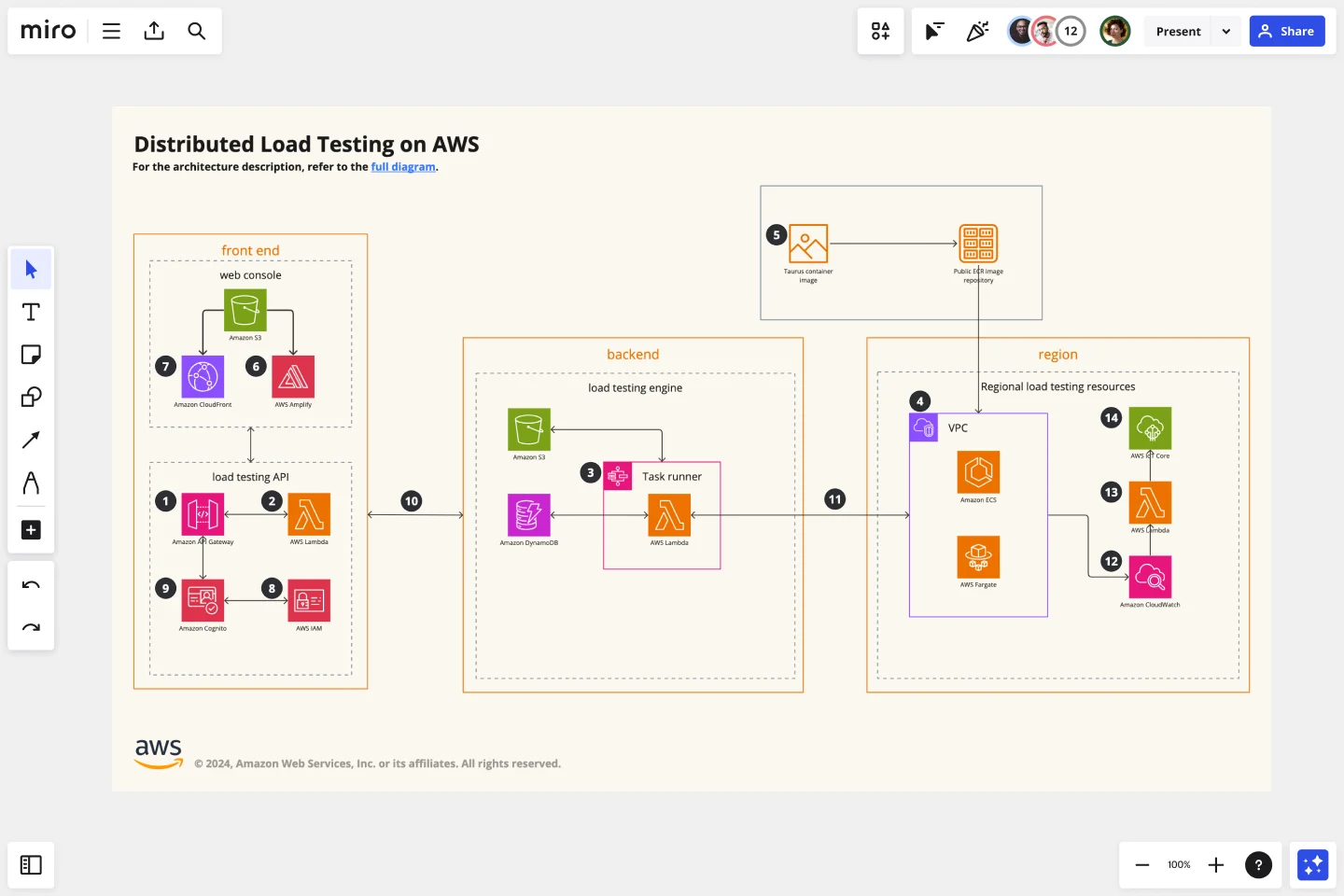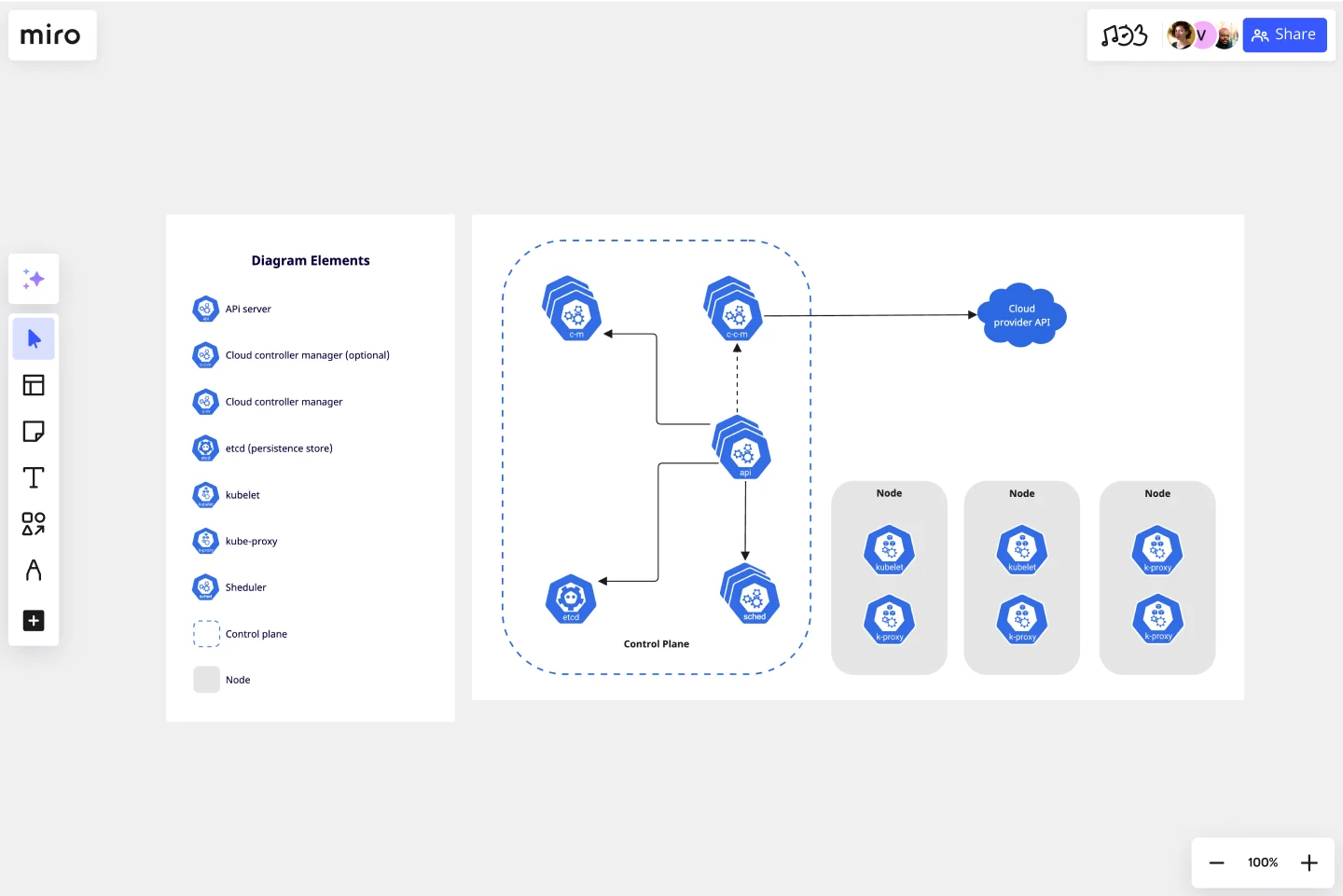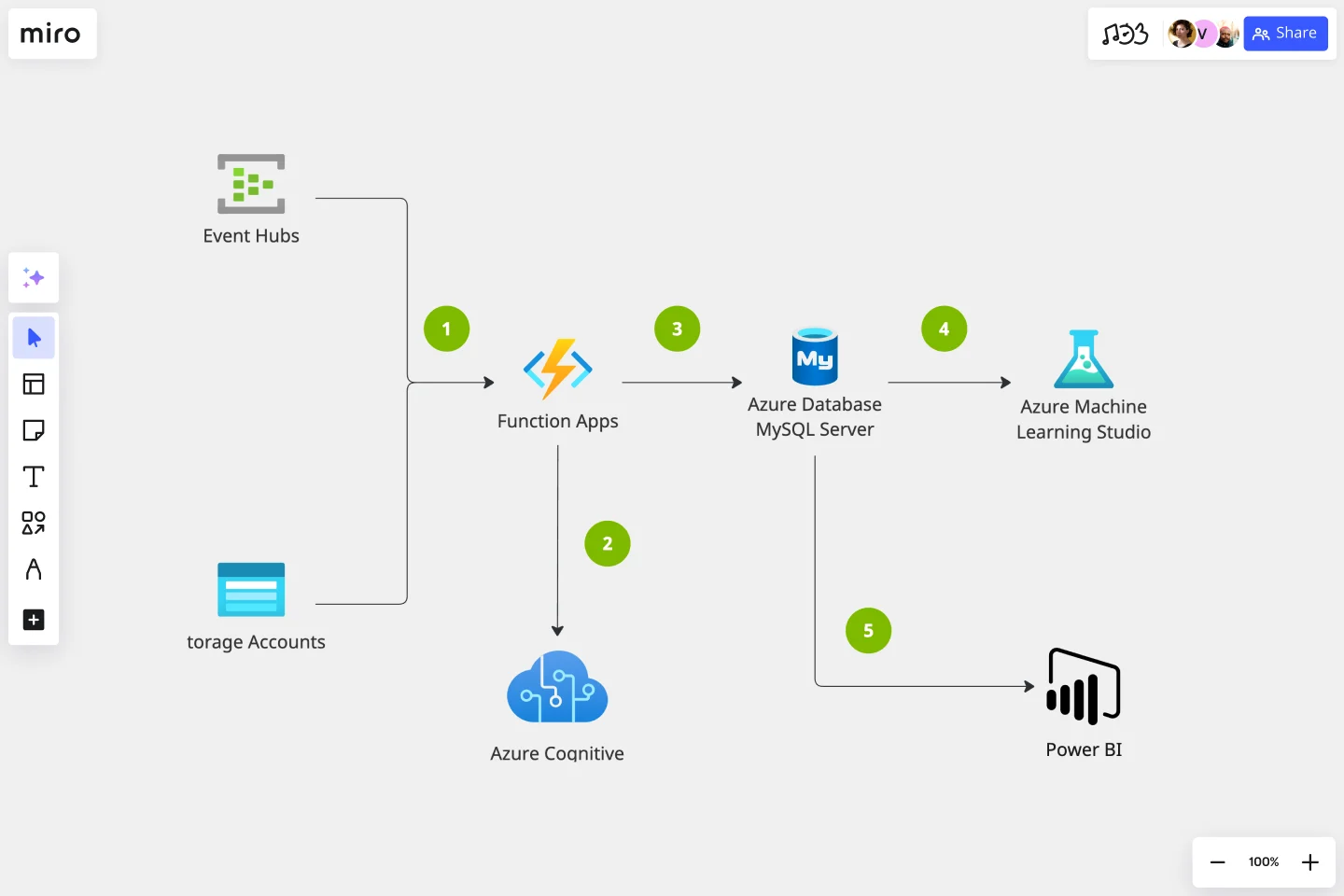
Streamline team efforts using innovative architecture diagram examples

Summary
In this guide, you will learn:
What architecture diagrams are and how they visualize system components and workflows
How to use Miro’s basic template for clear, high-level system overviews
The types of components, interactions, and data flows in architecture diagrams
How Miro’s shape library and diagramming tools support efficient diagram building
Ways to leverage Miro’s collaboration features for team feedback
Examples of architecture diagrams to inspire alignment and communication
Try Miro now
Join thousands of teams using Miro to do their best work yet.
Architecture diagrams are more than just visual aids—they’re a blueprint for clarity. Whether you’re designing a complex cloud infrastructure or aligning cross-functional teams on a project, architecture diagrams make the invisible visible. Let’s explore some examples to inspire your own diagrams, simplify workflows, and create better team alignment.
Architecture diagrams explained
Architecture diagrams help teams visualize and understand systems. They map out components, relationships, and workflows to provide clarity. Think of them as a guide that shows how everything connects, whether it’s technical, organizational, or conceptual.
Why they matter
Simplify complex ideas: Break down technical workflows into approachable visuals.
Improve collaboration: Make diagrams useful for developers, product managers, and stakeholders alike.
Align teams: Ensure everyone shares the same understanding of a system.
What exactly is an architecture diagram? At its core, it’s a visual representation of your system’s structure—whether that system is technical, organizational, or conceptual. By mapping components, relationships, and flows, architecture diagrams provide a clear, shared understanding of how everything fits together.
But here’s the secret: the best architecture diagrams don’t just work for developers. They’re also approachable for stakeholders, product managers, and anyone else involved in the process. With the right tools, you can create diagrams that are both detailed and accessible to everyone.
The basic architecture diagram example from our library
Starting with the basics is often the best way to get going. A simple architecture diagram can capture the big picture without overwhelming your audience. In our template library, the basic architecture diagram template is designed for clarity and ease of use.
Basic architecture diagram template

This architecture diagram template offers a high-level overview of a system or workflow. Use it to map out:
Components and their interactions
Data flows and dependencies
Processes or decision points
With Miro’s shape library, you’ll have access to all the fundamental icons and symbols you need, including general-purpose shapes and connectors. Plus, features like Diagram Autolayout can help you tidy up your diagram with just one click.
Other architecture diagram examples
Need something more specialized? Our innovation workspace comes packed with templates tailored for various platforms and use cases. Let’s explore some of the standout architectural diagram examples.
Google Cloud architecture diagram template

When working with Google Cloud, it’s important to visualize the specific services you’re using, how they’re connected, and how data flows between them. This GCP template simplifies the process, offering:
Pre-built Google Cloud icons from Miro’s Shape Library
Integration with AWS Cloud View, so you can bring in cloud infrastructure data seamlessly
Text to Diagram Support, enabling you to turn a text description into a dynamic diagram
Kubernetes architecture diagram template

Kubernetes is powerful, but let’s face it—it can get complicated fast. Miro’s Kubernetes template makes it easier to organize pods, nodes, services, and volumes. With features like Diagram Themes, you can even customize the visuals to match your organization’s branding or style.
Azure architecture diagram template

Azure’s architecture can be intricate, but this azure architecture template keeps everything clear and straightforward. With dedicated Azure shapes in the Shape Library and Layers functionality for toggling between views, you’ll have everything you need to:
Communicate high-level architecture
Zoom in on specific service connections or workflows
AWS architecture diagram template

AWS architecture diagrams are critical for planning and troubleshooting. Miro’s AWS template is designed to make your work easier:
Automatically generate diagrams by connecting your AWS account using AWS Cloud View
Use Switch Shapes to quickly adjust or iterate on your diagram as services evolve
Easily visualize and design systems using Miro's AWS diagram templates and examples.
Business intelligence architecture template

BI systems require alignment between data sources, ETL processes, and visualization tools. This business intelligence template is built to help teams map the full flow of data:
From raw data ingestion to actionable insights
With integrations like Jira or Azure to import related tasks as interactive cards
Why architecture diagrams are important
Now, let’s zoom out for a moment. Why bother with architecture diagrams in the first place? It’s not just about documentation—it’s about alignment and collaboration.
Communicate complex ideas simply
Architecture diagrams act as a universal language, bridging the gap between technical experts and stakeholders. With a well-crafted diagram, even the most complex workflows or systems become easier to understand.
Build alignment across teams
Whether your team is all in one room or distributed across the globe, diagrams help ensure everyone’s on the same page. Miro’s real-time and asynchronous collaboration tools allow you to create, iterate, and discuss diagrams no matter where your team members are.
Plan and troubleshoot effectively
From planning new systems to spotting inefficiencies in existing ones, architecture diagrams help you see both the big picture and the finer details. Features like Miro’s Layers make it simple to switch between macro and micro views without losing context.
Create your architecture diagram with Miro
If you’re ready to create architecture diagrams that truly work for your team, Miro’s innovation workspace has everything you need. From intuitive tools like the Shape Library and Smart Diagramming Tools to powerful integrations with Jira, Asana, and Azure, Miro streamlines the entire process.
But the best part? Miro makes collaboration effortless. You can brainstorm together in real-time or asynchronously add comments and updates. And with features like AWS Cloud View, Diagram Autolayout, and Export Options, you can focus less on logistics and more on designing systems that work.
Ready to bring clarity to your workflows and align your team? Explore Miro’s architecture diagram templates and see how they can help you document processes, plan systems, and collaborate like never before.
Author: Miro Team
Last update: October 9, 2025